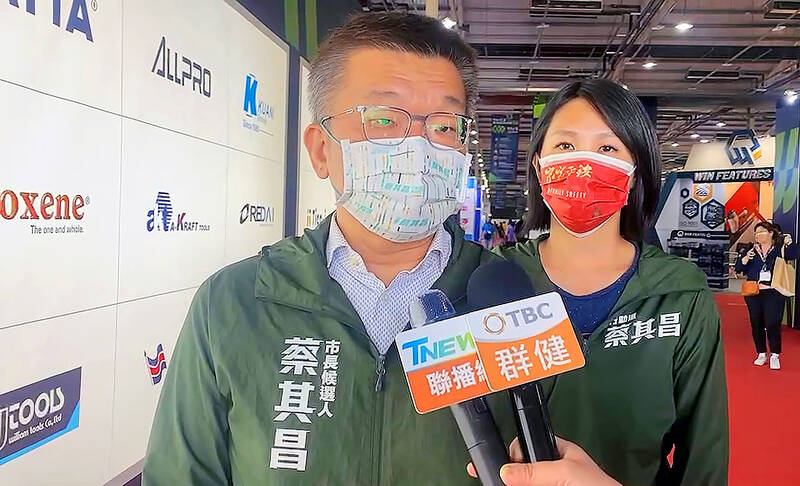Taichung has great industrial output and contributes a lot to Taiwan’s economic growth, but the city government’s transportation policies are lacking, Deputy Legislative Speaker Tsai Chi-chang (蔡其昌), the Democratic Progressive Party’s (DPP) mayoral candidate for the city, told the opening of the Taiwan International Tools and Hardware Expo yesterday.
Tsai addressed industry leaders and company executives at the launch of the three-day international event at the Taichung International Exhibition Center.
About 300 firms and vendors are exhibiting at expo, and more than 5,000 buyers and distributors from Taiwan and other countries attended the opening day, organizers said.

Photo courtesy of Tsai Chi-chang’s campaign office via CNA
Taichung and Changhua County are the main industrial clusters for tools, hardware accessories, metal processing machines and fasteners, while also supplying Taiwan’s semiconductor industry, Tsai said.
“In central Taiwan, we have the most complete and robust supply chain for semiconductor manufacturers and other important industries... It is well-known that Taiwan Semiconductor Manufacturing Co, as the leading semiconductor company, forms a ‘silicone shield’ to protect Taiwan,” he said.
“People should also know that Taiwan’s robust supply chains for semiconductors, as well as metal tools and hardware, are closely linked to rest of the world. If an emergency situation or conflict breaks out around Taiwan, it would severely disrupt the global supply chain,” he said.
“Therefore, besides sharing our values of democracy and freedom, Taiwan’s strength in economic and industrial development binds it closely to the international community,” Tsai said.
Taiwan is the third-largest exporter of hand tools in the world.
Exports of hardware and hand tools reached a record US$4.79 billion last year, up 27.4 percent from a year earlier, Ministry of Economic Affairs data showed.
In his role as Taichung mayoral candidate, Tsai said his platform includes expediting the acquisition of land for new industrial corridors and their construction.
He proposed the idea of “long-term lease only,” as it would not include expensive sales to manufacturing companies wanting to set up in the city.
Tsai said his transportation policy includes pushing to complete the Taichung MRT rail routes and extensions, as it would spur the local economy, creating jobs and ensuring young people stay in the city.
He also advocated construction of an elevated track for the Taiwan Railways Administration’s Coastal Line and completing its dual-track plan, as certain portions are still single track only, resulting in longer waits between trains.
Tsai said both plans had been approved by the Ministry of Transportation and Communications during the mayoral term of the DPP’s Lin Chia-lung (林佳龍), but were held back by Taichung’s current Chinese Nationalist Party (KMT) administration.
Taichung residents in the coastal districts have long waited for the Coastal Line railway plans to be completed, Tsai said, adding that it would stimulate the economy in those districts.
Taichung officials said in a statement on behalf of Taichung Mayor Lu Shiow-yen (盧秀燕) that they have held meetings on construction of the Coastal Line at local communities to gain feedback and suggestions over the past three years, and have requested funding approval, but are still waiting for the central government to give them the green light.

A group of Taiwanese-American and Tibetan-American students at Harvard University on Saturday disrupted Chinese Ambassador to the US Xie Feng’s (謝鋒) speech at the school, accusing him of being responsible for numerous human rights violations. Four students — two Taiwanese Americans and two from Tibet — held up banners inside a conference hall where Xie was delivering a speech at the opening ceremony of the Harvard Kennedy School China Conference 2024. In a video clip provided by the Coalition of Students Resisting the CCP (Chinese Communist Party), Taiwanese-American Cosette Wu (吳亭樺) and Tibetan-American Tsering Yangchen are seen holding banners that together read:

UNAWARE: Many people sit for long hours every day and eat unhealthy foods, putting them at greater risk of developing one of the ‘three highs,’ an expert said More than 30 percent of adults aged 40 or older who underwent a government-funded health exam were unaware they had at least one of the “three highs” — high blood pressure, high blood lipids or high blood sugar, the Health Promotion Administration (HPA) said yesterday. Among adults aged 40 or older who said they did not have any of the “three highs” before taking the health exam, more than 30 percent were found to have at least one of them, Adult Preventive Health Examination Service data from 2022 showed. People with long-term medical conditions such as hypertension or diabetes usually do not

Heat advisories were in effect for nine administrative regions yesterday afternoon as warm southwesterly winds pushed temperatures above 38°C in parts of southern Taiwan, the Central Weather Administration (CWA) said. As of 3:30pm yesterday, Tainan’s Yujing District (玉井) had recorded the day’s highest temperature of 39.7°C, though the measurement will not be included in Taiwan’s official heat records since Yujing is an automatic rather than manually operated weather station, the CWA said. Highs recorded in other areas were 38.7°C in Kaohsiung’s Neimen District (內門), 38.2°C in Chiayi City and 38.1°C in Pingtung’s Sandimen Township (三地門), CWA data showed. The spell of scorching

POLICE INVESTIGATING: A man said he quit his job as a nurse at Taipei Tzu Chi Hospital as he had been ‘disgusted’ by the behavior of his colleagues A man yesterday morning wrote online that he had witnessed nurses taking photographs and touching anesthetized patients inappropriately in Taipei Tzu Chi Hospital’s operating theaters. The man surnamed Huang (黃) wrote on the Professional Technology Temple bulletin board that during his six-month stint as a nurse at the hospital, he had seen nurses taking pictures of patients, including of their private parts, after they were anesthetized. Some nurses had also touched patients inappropriately and children were among those photographed, he said. Huang said this “disgusted” him “so much” that “he felt the need to reveal these unethical acts in the operating theater